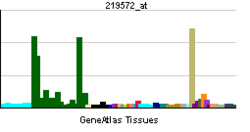CADPS2
| Ca++-dependent secretion activator 2 | |||||||||||||
|---|---|---|---|---|---|---|---|---|---|---|---|---|---|
| Identifiers | |||||||||||||
| Symbols | CADPS2 ; FLJ40851; KIAA1591 | ||||||||||||
| External IDs | OMIM: 609978 MGI: 2443963 HomoloGene: 23060 GeneCards: CADPS2 Gene | ||||||||||||
| |||||||||||||
| RNA expression pattern | |||||||||||||
 | |||||||||||||
| More reference expression data | |||||||||||||
| Orthologs | |||||||||||||
| Species | Human | Mouse | |||||||||||
| Entrez | 93664 | 320405 | |||||||||||
| Ensembl | ENSG00000081803 | ENSMUSG00000017978 | |||||||||||
| UniProt | Q86UW7 | Q8BYR5 | |||||||||||
| RefSeq (mRNA) | NM_001009571 | NM_001252105 | |||||||||||
| RefSeq (protein) | NP_001009571 | NP_001239034 | |||||||||||
| Location (UCSC) | Chr 7: 121.96 – 122.53 Mb | Chr 6: 23.26 – 23.84 Mb | |||||||||||
| PubMed search | |||||||||||||
Calcium-dependent secretion activator 2 is a protein that in humans is encoded by the CADPS2 gene.[1]
Function
This gene encodes a member of the calcium-dependent activator of secretion (CAPS) protein family, which are calcium-binding proteins that regulate the exocytosis of synaptic and dense-core vesicles in neurons and neuroendocrine cells.[1]
Interactions
This gene interacts with brain-derived neurotrophic factor.
Clinical significance
Cadps2 has been linked to autism[2] and is in the 7q autism susceptibility locus (AUTS1). However, the finding of aberrant CADPS2 splicing was not found to be significant in another study.[3]
A knockout mouse model was found to have autistic-like characteristics.[2]
CADPS2 has been linked to human and mouse brain structure in two large genomic studies.[4][5]
References
- ↑ 1.0 1.1 "Entrez Gene: CADPS2 Ca2+-dependent activator protein for secretion 2". National Center for Biotechnology Information.
- ↑ 2.0 2.1 Sadakata, T; Washida, M; Iwayama, Y et al. (2007). "Autistic-like phenotypes in Cadps2-knockout mice and aberrant CADPS2 splicing in autistic patients". Journal of Clinical Investigation 117 (4): 931–43. doi:10.1172/JCI29031. PMC 1821065. PMID 17380209.
- ↑ Eran, Alal; Graham, Kaitlin R.; Vatalaro, Kayla et al. (April 2009). "Comment on "Autistic-like phenotypes in Cadps2-knockout mice and aberrant CADPS2 splicing in autistic patients"". Journal of Clinical Investigation 119 (4): 679–80. doi:10.1172/JCI38620. PMC 2662571. PMID 19339759.
- ↑ French, L.; Pavlidis, P. (6 January 2011). "Relationships between gene expression and brain wiring in the adult rodent brain". PLoS Computational Biology 7 (1): e1001049. doi:10.1371/journal.pcbi.1001049. PMC 3017102. PMID 21253556.
- ↑ Stein, JL; Hua, X; Lee, S et al. (15 November 2010). "Voxelwise genome-wide association study (vGWAS)". Neuroimage 53 (3): 1160–74. doi:10.1016/j.neuroimage.2010.02.032. PMC 2900429. PMID 20171287.
Further reading
- Nagase T; Kikuno R; Nakayama M et al. (2001). "Prediction of the coding sequences of unidentified human genes. XVIII. The complete sequences of 100 new cDNA clones from brain which code for large proteins in vitro". DNA Res. 7 (4): 273–81. doi:10.1093/dnares/7.4.271. PMID 10997877.
- Nakayama M, Kikuno R, Ohara O (2003). "Protein-protein interactions between large proteins: two-hybrid screening using a functionally classified library composed of long cDNAs". Genome Res. 12 (11): 1773–84. doi:10.1101/gr.406902. PMC 187542. PMID 12421765.
- Strausberg RL; Feingold EA; Grouse LH et al. (2003). "Generation and initial analysis of more than 15,000 full-length human and mouse cDNA sequences". Proc. Natl. Acad. Sci. U.S.A. 99 (26): 16899–903. doi:10.1073/pnas.242603899. PMC 139241. PMID 12477932.
- Cisternas FA, Vincent JB, Scherer SW, Ray PN (2003). "Cloning and characterization of human CADPS and CADPS2, new members of the Ca2+-dependent activator for secretion protein family". Genomics 81 (3): 279–91. doi:10.1016/S0888-7543(02)00040-X. PMID 12659812.
- Speidel D; Varoqueaux F; Enk C et al. (2004). "A family of Ca2+-dependent activator proteins for secretion: comparative analysis of structure, expression, localization, and function". J. Biol. Chem. 278 (52): 52802–9. doi:10.1074/jbc.M304727200. PMID 14530279.
- Ota T; Suzuki Y; Nishikawa T et al. (2004). "Complete sequencing and characterization of 21,243 full-length human cDNAs". Nat. Genet. 36 (1): 40–5. doi:10.1038/ng1285. PMID 14702039.
- Gerhard DS; Wagner L; Feingold EA et al. (2004). "The status, quality, and expansion of the NIH full-length cDNA project: the Mammalian Gene Collection (MGC)". Genome Res. 14 (10B): 2121–7. doi:10.1101/gr.2596504. PMC 528928. PMID 15489334.
- Binda AV, Kabbani N, Levenson R (2005). "Regulation of dense core vesicle release from PC12 cells by interaction between the D2 dopamine receptor and calcium-dependent activator protein for secretion (CAPS)". Biochem. Pharmacol. 69 (10): 1451–61. doi:10.1016/j.bcp.2005.02.015. PMID 15857609.
- Kimura K; Wakamatsu A; Suzuki Y et al. (2006). "Diversification of transcriptional modulation: large-scale identification and characterization of putative alternative promoters of human genes". Genome Res. 16 (1): 55–65. doi:10.1101/gr.4039406. PMC 1356129. PMID 16344560.
This article incorporates text from the United States National Library of Medicine, which is in the public domain.